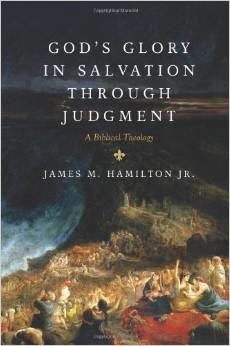Our generation is blessed to witness the rise of informed interest in the discipline of Biblical Theology – a reading of Scripture that follows its own storyline and traces out its own categories of developing thought. Reading our Bible this way we are inevitably reminded that it truly is a book written about Jesus, from first to last, and a book with an unmistakable gospel shape. Dr. James M. Hamilton’s passion for Biblical Theology is well known. And as we have already noted here on Books At a Glance, in his The Bible’s Big Story: Salvation History for Kids, he writes Biblical Theology even for your little children. In his What Is Biblical Theology? he provides an entry-level introduction to the discipline, and in his God’s Glory in Salvation Through Judgment he seeks to expose the “center point” of the Bible’s story. With these and his many other works continues to contribute to this blossoming field of study.
Dr. Hamilton is professor of Biblical Theology at Southern Baptist Theological Seminary, and he also serves as a member of our Board of Reference here at Books At a Glance and as our Review Editor for Biblical Theology. We’re thankful for his friendship and his ministry, and we are pleased that he could talk to our readers today about his work.
Books At a Glance (Fred Zaspel):
We often like to begin on a personal note. Please tell us something about your interest to specialize in Biblical Theology. How did this interest come about? Are there specific theologians from the past who have influenced you particularly?
 Hamilton:
Hamilton:
I remember a strong desire to understand the Bible taking root during my junior year of High School. Around that time I was being taught to think more carefully about literature, and I knew there was more to the Bible but didn’t know how to explore its depths.
I majored in English in college, and then I went to DTS because that’s where Tommy Nelson of Denton Bible Church had gone. A friend had given me cassette tapes of Tommy Nelson’s sermons, and he was the first preacher I had heard who explained the Bible the way my English teachers explained literature.
At DTS, I was eager to understand the whole Bible, particularly the use of the Old Testament in the New. One of the reasons I was drawn to SBTS was that they had a Biblical Studies PhD that would allow students to do OT and NT rather than just one or the other. At the time I didn’t know what biblical theology was, but looking back now I see that’s what I wanted to do. Once at SBTS, Tom Schreiner quickly convinced me that the NT authors had rightly understood the OT, and Schreiner turned me on to others such as G. K. Beale, T. D. Alexander, Paul House, Stephen Dempster, and John Sailhamer.
Books At a Glance:
You make much of the “interpretive perspective” of the biblical authors. Just what do you mean by this? What specifically does it entail with regard to what we call the discipline of Biblical Theology?
Hamilton:
The interpretive perspective of the biblical authors is the mix of assumptions they share about who God is, what his purposes are, what’s right and wrong, and the big story in which it all makes sense. You could say their interpretive perspective is the application of their worldview to the task of understanding earlier Scripture and their own situations.
In my view the whole point of biblical theology is to understand and embrace the interpretive perspective of the biblical authors. I think their worldview is normative.
Books At a Glance:
We assume that Biblical Theology is not for the professional theologian only, or just for those who teach and preach the Bible publicly. And your What Is Biblical Theology? serves well as an introduction to the subject for “the laity” as well as the seminary student. What is the leading value(s) of a growing understanding of Biblical Theology for the Christian?
Hamilton:
As Christians, we are followers of Jesus. Churches minister in order to bring about Christlikeness. As Paul says in Ephesians 4, we’re trying to “attain to the unity of the faith and of the knowledge of the Son of God, to mature manhood, to the measure of the stature of the fullness of Christ . . . to grow up in every way into him who is the head, into Christ” (Eph 4:13, 15).
So to be a Christian is to be a follower of Jesus and to become like him in every way, including the way that he understood the Bible. As a human being Jesus “grew in wisdom” (Luke 2:52), and one aspect of this was his learning to read the Bible from Moses, the Prophets, and the Writings of the OT. Jesus learned to read the Bible in accordance with the way those Spirit-inspired human authors intended their books to be read, and Jesus taught his disciples to read the OT way the same way. When the followers of Jesus wrote the books of the New Testament, they applied the interpretive perspective that they had learned from Jesus, who had learned that same perspective from Moses and the Prophets and the Psalmists.
You don’t have to call it “biblical theology” like I do, but if you’re trying to take every thought captive to the knowledge of Christ, you’re doing biblical theology because you’re trying to understand the Bible and life the same way that Jesus did. Biblical Theology, then, is simply Christlikeness applied to Bible reading, and then the application of what you learn doing that to the task of understanding life.
Books At a Glance:
We think your What Is a Biblical Theology? is a great place to begin the study. (We assumed you would not feel comfortable saying this yourself, so we’ve said if for you!) But condensed as it is, your book suggests throughout that there is so much more to explore. And there is seemingly no end to the reading available on the subject, including your own God’s Glory in Salvation Through Judgment. So, once a person has read What Is Biblical Theology? and has glimpsed the “big picture,” how could he or she most profitably pursue the study further? Is it best simply to pursue reading large chunks of Scripture at a time to see the big picture? Or perhaps pursuing specific themes as they unfold in that story? All of it is important, but please suggest how a beginner can best plot his way forward.
Hamilton:
Thanks! I wrote God’s Glory in Salvation through Judgment (GGSTJ) in the hope that people would use it to take a “guided tour” of the Bible. So I would recommend that people start in Genesis, read a big chunk of the book, then go read the corresponding section of GGSTJ. Repeat for the rest of the Bible . . .
Books At a Glance:
Speaking of your God’s Glory In Salvation Through Judgment, please explain briefly the significance of your title, especially in relation to your project. And how does this help us in seeing that the Bible really is a about Christ?
Hamilton:
God saved his people through the judgment of Jesus. When God did that, he established his justice and made a way to show mercy. Without justice, mercy would be nothing more than injustice selectively applied. But God is not unjust. God is righteous, and he is righteous when he forgives.
When God saved through the judgment of Jesus, he was fulfilling the pattern seen when he did the same thing at the flood, at the exodus, at the exile, and he’ll do it again when Jesus returns.
God’s ability to be just and merciful is the pinnacle achievement of the display of God’s glory that is creation and history.
When God explains why he acts, he declares that he means to show his own glory in salvation through judgment (e.g., Exod 34:6–7).
When the biblical authors celebrate God in doxologies, this is what they say (e.g., Rom 11:32–36).
And when God’s people pray, they appeal to him to act for his own sake, for his own glory (e.g., Dan 9:16–19).
I think the glory of God displayed in his justice and mercy, in his accomplishment of salvation through judgment, was the controlling idea in the theology of every single biblical author, so I’m convinced it’s rightly described as the center of biblical theology.
Books At a Glance:
Finally, we understand that you / SBTS are now offering a D.Min. degree with a focus on Biblical Theology. Do we assume correctly that you will be involved in this program? Please tell us something about this rather unique degree and your hopes for it with regard to those in preaching ministry.
Hamilton:
Yes! We want to give pastors the opportunity to refresh and deepen their skills in the biblical languages, and then we want to walk with them through the application of that study of the biblical languages to the attempt at understanding the interpretive perspective of the biblical authors, that is, to doing biblical theology. And all this is meant to serve the task of preaching the word of God to the people of God.
We’ve also started a PhD concentration in biblical theology.
May the Lord conform us to his image, from one degree of glory to another (2 Cor 3:18).
Books At a Glance:
Many thanks for your good work and for taking the time to speak to our readers! We hope to talk with you about Biblical Theology again sometime.
Hamilton:
My pleasure! Thanks for having me.


